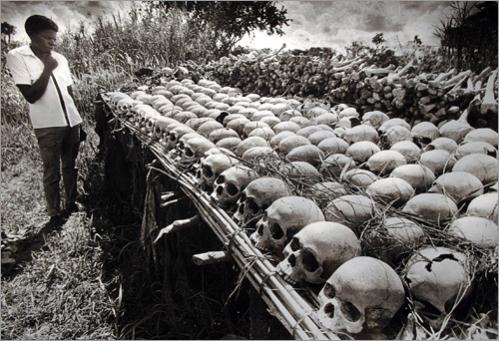Uganda
Julius Nyerere: Legacy and defeated dreams in Tanzania

Obama in South Africa: Washington tells Pretoria how to ‘play the game’ in Africa

Protesters greet Obama, June 28, 2013.
Land grabbing: A new colonialism

A nascent oil palm plantation in southeastern Sierra Leone owed by Socfin Agriculture Company, which in March 2011 signed a 50-year lease with the government of Serra Leone. Photo by Felicity Thompson/IRIN.
By Alan Broughton
November 6, 2012 – Links International Journal of Socialist Renewal -- Since the global financial crisis of 2008 and its associated food crisis that sent another 200 million people into malnutrition, there has been a massive grab for land by large corporations around the world. Worst hit has been Africa, where food security is already non-existent for many people. Governments, including the Australian government, welcome this “investment” in agriculture, some bizarrely claiming that food security will be increased.
Washington in Africa, 2012: Who will Obama ‘whack’ next?

Graphic from the Economist.
By Patrick Bond
[Address to the Muslim Youth Movement 40th Anniversary Conference, University of KwaZulu-Natal, Durban, September 30, 2012. Posted at Links International Journal of Socialist Renewal with the author's permission.]
At a time when popular revolutions are sweeping the globe, the United States should be strengthening, not weakening, basic rules of law and principles of justice enumerated in the Universal Declaration of Human Rights. But instead of making the world safer, America’s violation of international human rights abets our enemies and alienates our friends. – Former US president Jimmy Carter, 25 June 2012, New York Times
Video: Eight myths behind 'Kony 2012'
March 27, 2012 – A video by Green Left Week
Uganda: How the West brought Idi Amin to power

Some of the victims of the Idi Amin regime recovered by local farmers in the fertile fields of the Luwero Triangle region
Uganda: Why 'Kony 2012' will bring more misery to Africa

US Navy special forces.
Class war and the Anglican schism
July 29, 2008 -- Dramatic events within the worldwide Anglican Communion (the international association of national Anglican churches) have revealed a “cold split” with the potential for a complete collapse of the Episcopal formation. Superficially, the debates have centred on the right of women and homosexuals to be priests and bishops, and on gay marriage. However, while theological arguments dating back centuries are being mouthed, behind them are class-war elements of more recent vintage, including some connected with the era of US President Ronald Reagan’s backing of Central American death squads in the 1980s.
African bishops have led the charge against modernity, but they are funded and organised by right-wing US think tanks and the Sydney Anglicans’ arch-reactionary Archbishop Peter Jensen. Another player is the Vatican, which has been reported as throwing its resources behind Anglican Primate Rowen Williams.
Pope's immoral stance a death sentence; protest the unholy father
By Tony Iltis
July 12, 2008 -- The visit to Sydney for World Youth Day (WYD), July 15-20, by Pope Benedict XVI and 300,000 Catholic pilgrims is set to become the scene for protests. Ironically, the protests are being fuelled by the clumsy efforts of the NSW state Labor Party government to suppress them — passing laws making it illegal to “annoy” pilgrims and defining “annoy” broadly enough to include having signs, or even wearing t-shirts, with messages that the doctrinally rigid pope or his followers disapprove of.
* * *